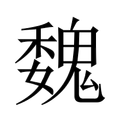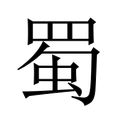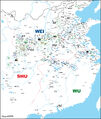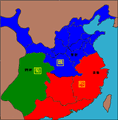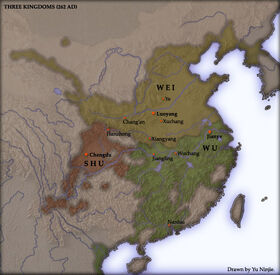
The Three Kingdoms period (Chinese: 三國時代; Pinyin: Sānguó shídài) was a time of disunity in ancient China following the de facto power of the Han Dynasty and lasted from 220 until 280. After a period of infighting between various warlords from 184-220 three men survived with the strongest following; Cao Cao, Liu Bei and Sun Quan. When Cao Cao died in 220 and his son Cao Pi succeeded his fief as King of Wei he took the next step and forced the abdication of Emperor Xian of Han to found his own Wei Dynasty. Thereby ending the Han and ushering in the period of the Three Kingdoms. His rivals Liu Bei and Sun Quan followed within two years; Liu Bei re-founded Han and Sun Quan founded Wu.
Strictly speaking, the Three Kingdoms period refers to the years 220, the foundation of Wei, until 280, the destruction of Wu by Jin. However the starting point is often dated back to the year 184, when Zhang Jue 張角 instigated the Yellow Turban Rebellion against the Han. Other arguable starting points are 189, after the extermination of the eunuchs and power seizure of Dong Zhuo or 168, when the eunuchs first took indirect power.[n 1]
The name 'Three Kingdoms' is somewhat of a mistranslation as guó 國 actually means 'state' or 'country'. Furthermore, a kingdom is ruled by a king, but Wei, Shu-Han and Wu were ruled by emperors. The translation 'Three Kingdoms' has become the common term possibly because it is the popular translation of the fictitious novel Sānguó yǎnyì 三國演義; "Romance of the Three Kingdoms".[n 2]
The Three Kingdoms[]
History[]
Fall of Han - Rise of Warlords[]
- Read more: Yellow Turban Rebellion
- Read more: Struggle against The Regular Attendants
The fall of Han can be dated back to the Yellow Turban Rebellion in the year 184. This revolt was instigated by the religious leader Zhang Jue and his two younger brothers Zhang Bao 張寶 and Zhang Liang 張梁. Having gathered over "hundreds of thousands" followers through their teachings, the Way of Great Peace, they launched their attack in the spring of 184.
The Yellow Turbans had some initial successes against the much more experienced forces of the Han, but eventually the tides changed. Zhang Jue fell ill and died and not long after his two brothers had fallen in battle against Huangfu Song 皇甫嵩. The Han was victorious and despite their swift response, they paid a heavy price for their victory. Moreover, rebel groups such as the Rice Rebels, the Liang rebels and Black Mountain Bandits had risen among the turmoil of the Yellow Turban Rebellion.
While the main rebellion was put down by Han generals Huangfu Song, Fu Xie 傅燮, Lu Zhi 盧植 and Zhu Jun 朱儁, three other men participated who would later serve importance to the rise of the Three Kingdoms. These men were Cao Cao 曹操, Liu Bei 劉備 and Sun Jian 孫堅. In 189 Emperor Ling passed away and his son Liu Bian 劉辯, became Emperor two days later. The Emperor's eunuchs and the General-in-Chief He Jin 何進 hated each other, and after the passing of the emperor, they started plotting against each other. He Jin summoned Dong Zhuo 董卓 from the west, to assist in his campaign against the eunuchs. Dong Zhuo arrived too late, as the General-in-Chief had already been killed and his forces led by Yuan Shao 袁紹 and others had already avenged him by killing every eunuch in the palace.
Now in the palace, Dong Zhuo deposed Liu Bian and set the young Liu Xie 劉協 upon the throne, only to manipulate him for his own gain. He further strengthened his influence by obtaining the services of the famous fighting man Lü Bu 呂布. In the meantime the warlords Yuan Shao, Yuan Shu 袁術 and Cao Cao had fled the capital and an edict was sent to various warlords across the empire. Their call was heard and a coalition was formed to end the tyrannical reign of Dong Zhuo. Among these warlords were Cao Cao and Sun Jian, earlier active during the Yellow Turban Rebellion.[n 3]
Sun Jian and Cao Cao were the only ones taking any serious actions against Dong Zhuo. Sun Jian scored some impressive victories over Hu Zhen 胡軫, Lü Bu and Dong Zhuo himself, and even took Luoyang from him. All to not much avail, as Dong Zhuo fled west to Chang'an with the emperor and the warlords of the coalition started warring against each other. In 192 Dong Zhuo was assassinated by Lü Bu and Chang'an fell in the hands of some of Dong Zhuo's former men. Lü Bu fled in search for a base. Some years later the Emperor managed to escape from Chang'an and was welcomed into Luoyang by Cao Cao, who took him into his custody.
The land lay in chaos and from this moment onwards it was every warlord for himself. The most notable men were:
- Gongsun Zan in the northeast.
- Yuan Shao in the northeast.
- Yuan Shu to the south of Luoyang.
- Liu Biao in Jing Province.
- The Sun family of Sun Jian in Yang Province in the southeast.
- Liu Bei in the northeast.
- Cao Cao in the north.
- Liu Zhang in the west.
- Lü Bu in the east.
- Li Jue in the east.
- Ma Teng in the east.
Some time before the death of Dong Zhuo many of the above men had already engaged in armed conflict, even the leaders of the coalition were warring against each other. Yuan Shu warred with Liu Biao and Yuan Shao, while Yuan Shao was in conflict with Gongsun Zan.
In 191 Sun Jian was sent to battle Liu Biao near Xiangyang, but died in an ambush and was succeeded by his eldest son Sun Ce 孫策.
Lü Bu was destroyed by Cao Cao in 197 and some of his men such as Zhang Liao 張遼 went to serve Cao Cao. Yuan Shu proclaimed himself emperor of a dynasty called Zhong but was shortly after destroyed by allied forces of Cao Cao, Liu Bei and Sun Ce, who were fighting in name of the Han. Gongsun Zan was a rival of Yuan Shao and the two men had been fighting ever since the split of the coalition. In 199 Yuan Shao finally defeated Gongsun Zan and took over his lands and forces. The northern provinces were at that piont shared between Cao Cao and Yuan Shao and a great battle ensued between these two men the next year. Liu Bei served Yuan Shao at this point and was sent to fight against Cao Cao alongside one of Yuan Shao's top generals Wen Chou 文醜. As the land witnessed the Battle of Guandu between Cao Cao and Yuan Shao in the north, Sun Ce in the south had been conquering territory after territory and had established a base for himself. Later in 200 Cao Cao defeated Yuan Shao and in 202 he had defeated his three sons as well and taken over all of the Yuan family's lands. In the meantime Sun Ce had died and was succeeded by his younger brother Sun Quan 孫權 and Liu Bei had fled south to Liu Biao in Jing Province.
Cival War Ends - Three Warlords Remain[]
In 208 Cao Cao mustered over 200.000 men and headed south in an attempt to unite the lands. He first went though Jing Province. As Cao Cao was nearing, Liu Biao died. His son and Liu Bei fled southwards from Cao Cao and were rescued by Zhou Yu 周瑜, an important commander for the Sun family. Liu Bei and Sun Quan decided to join forces in an attempt to stop Cao Cao's invading navy. Zhou Yu was appointed as commander of the allied forces, which was only 50.000 men large. Huang Gai 黄蓋, a general for the Sun family, came up with the idea to put some of their own boats under fire and ram Cao Cao's navy with it. Zhou Yu agreed, the plan was set in motion and together the allied forces scored a remarkable victory. Following this victory, Cao Cao retreated back north, while the south was divided between Liu Bei and Sun Quan.
The southern alliance was not stable. Sun Quan and his men of Wu thought that Liu Bei did not divide the conquered territory fairly. At the battle of Chibi the main blow against Cao Cao was dealt by Wu when they destroyed Cao Cao's fleet with fire. Wu also had the larger army and suffered more casualties, but the biggest reward for this victory was reaped by Liu Bei, who seized most of Jing Province. Liu Bei and his advisor Zhuge Liang 諸葛亮 promised they would return more land to Wu some day, but that day would never come.
Following his loss at Chibi Cao Cao headed back north, but in 211 he was attacked by Ma Chao 馬超, son of Ma Teng. At Tong Pass Cao Cao managed to defeat Ma Chao and thereby stabilized his control of the north.
About 212 Liu Zhang 劉璋, a kinsman of Liu Bei who controlled Yi Province which neighboured Jing Province to the west, feared that Cao Cao might attack Yi Province and sent one of his men to form an alliance with Liu Bei. Liu Bei then led his men to Yi Province under the pretense of helping Liu Zhang conquer Hanzhong, but eventually Liu Bei conquered Yi Province from his kinsman.
Liu Bei now controlled the provinces Yi and Jing, Sun Quan controlled Yang Province and Cao Cao controlled the northern smaller but more flourishing provinces. Three warlords. One land. One goal: conquest.
The Three Kingdoms[]
For some years Cao Cao, Liu Bei and Sun Quan had been mainly battling regional warlords close to their territory. Now with these warlords gone, the three of them could focus solely on each other. Liu Bei and Sun Quan both focussed on Cao Cao, which resulted in battle at Hefei (victory for Cao Cao over Sun Quan), Hanzhong (victory for Liu Bei over Cao Cao), Fancheng (victory for Cao Cao over Liu Bei) and two battles at Ruxu (both victories for Sun Quan over Cao Cao).
In 219 Liu Bei, despite his promise, still controlled Jing Province which was now defended by his close general Guan Yu 關羽. While Guan Yu was battling the forces of Cao Cao who were invading from the north, Sun Quan's commander Lü Meng 呂蒙, a protégé of Zhou Yu, set out for a surprise attack on Guan Yu. The plan was a success and Jing Province fell in the hands of Lü Meng while Guan Yu was still fighting to protect it from Cao Cao's forces. Guan Yu fled to Maicheng, where he became surrounded by forces of Sun Quan and Cao Cao. Guan Yu tried to escape but was captured and eventually executed. Sun Quan now controlled Yang and Jing Province.
In 220 Cao Cao died in Luoyang and his son Cao Pi 曹丕 succeeded his title as King of Wei. Later that year he forced Liu Xie, the Emperor of Han, to abdicate the throne. Cao Pi subsequently founded Wei.
A year later Liu Bei re-founded the Han, also known as Shu-Han, and crowned himself its Emperor. Shortly after he attacked Wu in an attempt to avenge the death of Guan Yu. Before departure his other close general, Zhang Fei 張飛, was murdered by two of his men who subsequently fled to Wu. At Xiaoting Liu Bei's army suffered a massive defeat at the hands of Lu Xun 陸遜 and was forced to retreat.
In 222 Sun Quan founded Wu, but did not name himself its Emperor yet.
In 223 Liu Bei died and was succeeded by his son Liu Shan 劉禪. Shan's talents were doubted by even his father, thus Liu Bei named Zhuge Liang and Li Yan 李嚴 as regents.
Decline of the Three Kingdoms[]
In Cao Pi Wei had a talented and capable successor to Cao Cao, but Cao Pi died less than six years after he founded Wei. He was succeeded by his son Cao Rui, who was capable, but relatively young when he ascended the throne.
Maps[]
See also[]
- List of people of the Three Kingdoms
- List of provinces, commanderies and cities
- List of titles of Later Han, Three Kingdoms and Western Jin
- List of animals of the Three Kingdoms
- Timeline of the Three Kingdoms
- Wei, Shu-Han, Wu
- Han, Jin
- Records of the Three Kingdoms
- Romance of the Three Kingdoms
External links[]
Notes[]
- ↑ In 168 something reminiscent of He Jin's eunuch struggle happened, as a man named Dou Wu 竇武, also General-in-Chief at that time, opposed a group of eunuchs. In simple terms, Dou Wu was "good" and the eunuchs were "bad", yet the eunuchs had the support of the Emperor and Dou Wu was ultimately branded a traitor and killed. Internal problems lead to external problems, which is why this is marked as a starting point of the fall of Han.
- ↑ Another mistranslation that has become popular because of it's use in Romance of the Three Kingdoms, is "Yellow Turbans" 黃巾, the character 巾 actually means just 'cloth', not 'turban'.
- ↑ Sun Jian was has not only been active during the campaign against the Yellow Turbans, but also against the rebels from Liang Province and rebels in the south of Jing Province.
References[]

